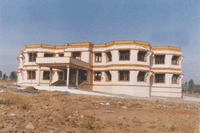One of the most well-kept secrets of the education ministry of successive governments of the southern state of Karnataka (pop. 57 million) is the existence within state borders of 385 Shri Morarji Desai and nine Navodaya fully residential schools, which provide free of charge class VI-X education to scheduled caste (SC), scheduled tribe (ST) and other backward caste (OBC) children. Modelled on the Central-government promoted Jawahar Navodaya Vidyalaya schools, the first Morarji Desai and Navodaya schools became operational in 1995-96. Currently these secondary schools, spread across 27 districts of Karnataka, have 98,000 students instructed by 3,940 teachers — including 1,500 ‘contract teachers’ — on their muster rolls.
 However this state secret was outed on Republic Day (January 26), when 1,300 teachers and principals of these state government-funded schools were all set to go on a hunger strike in Belgaum, where a special session of the Karnataka legislative assembly, which cost the exchequer Rs. 24 crore, had just concluded. The teachers were agitating about having had to make ends meet as lower paid contract teachers for over ten years. The hunger strike was averted at the eleventh hour with the state government promising the aggrieved teachers that “a decision on their demands would be taken before February 21”.
However this state secret was outed on Republic Day (January 26), when 1,300 teachers and principals of these state government-funded schools were all set to go on a hunger strike in Belgaum, where a special session of the Karnataka legislative assembly, which cost the exchequer Rs. 24 crore, had just concluded. The teachers were agitating about having had to make ends meet as lower paid contract teachers for over ten years. The hunger strike was averted at the eleventh hour with the state government promising the aggrieved teachers that “a decision on their demands would be taken before February 21”.
Typically, after promoting these model residential schools for SC/ST and OBC children with great fanfare at the estimated cost of Rs. 2 crore each, the state government has neglected their contract teachers/principals who subsist on a mere Rs.6,500 per month against the Rs.13,000 paid to permanent teachers. Moreover during the April-May summer vacations, contract teachers don’t get paid at all. Ditto school principals hired on contract. Most of the contract teachers/principals were employed 10-12 years ago, when there was a major teacher crunch in state government schools.
Comments G.S. Gupta, principal of the Morarji Desai School at Sulibele in Hoskote taluk, who despite his rank is not a permanent tenure employee of the state government: “I have been recruited through the proper process applicable to permanent teachers. Therefore why this patent injustice?”
 Although he didn’t do anything substantial for the Morarji Desai or Navodaya schools during his 13-month tenure as the education minister of Karnataka (in 2007), Basavaraj Horatti has now taken up the cause of these aggrieved teachers. “They have been demanding their right to equal pay for over a decade now. Every time the teachers propose to go on strike, the government in power pacifies them with the promise that their demands will be met. However, this time the BJP state government has given us a legally binding assurance that the process of regularisation of their posts will start by February 21. We will wait and watch until then. But if they don’t keep their promise this time, I will join them in their indefinite hunger strike in Belgaum,” says Horatti.
Although he didn’t do anything substantial for the Morarji Desai or Navodaya schools during his 13-month tenure as the education minister of Karnataka (in 2007), Basavaraj Horatti has now taken up the cause of these aggrieved teachers. “They have been demanding their right to equal pay for over a decade now. Every time the teachers propose to go on strike, the government in power pacifies them with the promise that their demands will be met. However, this time the BJP state government has given us a legally binding assurance that the process of regularisation of their posts will start by February 21. We will wait and watch until then. But if they don’t keep their promise this time, I will join them in their indefinite hunger strike in Belgaum,” says Horatti.
At the root of this decade-old confrontation is lack of state government funding for the Sri Morarji Desai and Navodaya schools. Constructed at a cost of Rs.2 crore each, the annual grant sanctioned for the 385 Sri Morarji and nine Navodaya schools is a paltry Rs.119 crore — completely inadequate to fund the board, lodging and education expenses of 98,000 children and teachers’ salaries. Regularising over 1,300 contract teachers would mean an additional expenditure of Rs.15 crore for the state government, excluding employee benefits such as provident fund and medical insurance.
The nine day special legislative session in Belgaum cost the state government an unbudgeted Rs. 24 crore. Curiously this amount, which is enough to cover the additional annual outlay required by the 385 Morarji Desai and nine Navodaya schools didn’t pose any problem at all.
Debolina Sengupta (Bangalore)